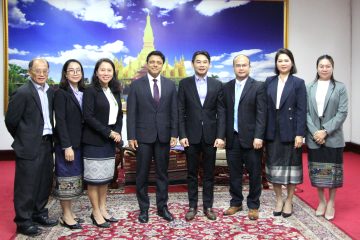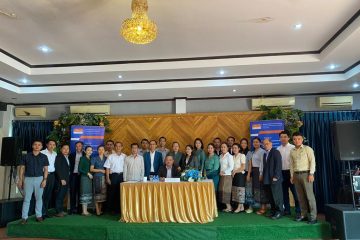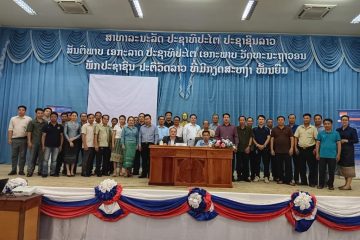ECL Project Completion Meeting
Luangphabang, August 16, 2023. The Department of Planning and Cooperation, Ministry of Industry and Commerce (MOIC), in collaboration with the three provincial Departments of Industry and Commerce and Chambers of Commerce and Industry, organized an ECL Project Completion Meeting.
The meeting was chaired by Mr. Sengphanomchone Inthasane, Deputy Director General of the Department of Planning and Cooperation, with more than 70 participants from the project implementation stakeholders and the activity’s partners, including representatives from three provincial Departments of Industry and Commerce, National and provincial Chambers of Commerce and Industry, and the lead firm- OCK POP TOK the weaving craft center.
In his opening remarks, Mr. Sengphanomchone Inthasane reiterated that the overview of the Project on Promotion of Export Competitiveness and Sustainability Support to Public-Private Dialogue in Northern Lao PDR or ECL in brief, and the objective of ECL project which aims at promoting export of potential agricultural products in three northern provinces namely: rice in Luangnumtha, wheat in Oudomxay and tea in Phongsaly and some handicraft production in rural districts of those provinces.
Mr. Chair also added that since the project started its implementation in February 2019, and numbers of challenges faced during the pandemic of COVID-19, which delayed some key project activities implementation and led to project extension twice in 2021 with no cost added; and the second one in 2022 in order to expand the project closure to September 2023 with a small amount of funds added to the project, aiming to extend its impact to a broader beneficiary. As ECL project has now been arriving at the completion, recently, the Validation Workshop was also organized to review the outcomes of the project’s final assessment and provide input for validation.
From the impact assessment validation workshop, the ECL Project Completion Meeting is therefore organized to summarize key results, lesson learnt from project implementation and ways forward for the sustainability after project closure. In this meeting the Deputy Director of National Implementation Unit (NIU) under the Department of Planning and Cooperation of MOIC presented the overall achievements as the project coordinating body and the representatives from each provincial Departments Industry and Commerce also highlighted the key results of each product promotion and export.
The meeting also discussed how the project has been facilitating the public-private dialogue through collaboration with relevant agencies to enhance the capability of rice production and improve governing policies.
The provincial CCIs also stressed that the LPPD has solved many issues raised by the private sector during the two rounds of dialogues with the support of the ECL project. As representatives of the private sector, the provincial CCIs are willing to continue the dialogue, but the financial weakness of the organization and staff capacity are major challenges to overcome. The contribution of the private sector will play the ultimate role in continuing dialogue after project closure.
In the closing remark, the chair expressed his sincere thanks to the Enhanced Integrated Framework (EIF)- the donors to this project and great gratitude to all representatives and requested further support from the local public and private sectors in extending and replicating these established structures and technical knowledge to a wider range of people. The chairs also shared notable achievements of this small project that generated extreme impact for the public sector and the poor in far-reaching areas. Thanks to the hard work and commitment of provincial agencies and NIU, the project earned the earmark as a pro-poor effort from the Ministry of Industry and Commerce to the three northern provinces.
The ECL Project is funded by the Enhanced Integrated Framework (EIF). EIF is an Aid for Trade partnership in action for the Least Developed Countries (LDCs). Operational since 2009, the EIF is a multi-donor program that supports the LDCs to become more active players in the global trading system by helping them tackle supply-side constraints to trade.


